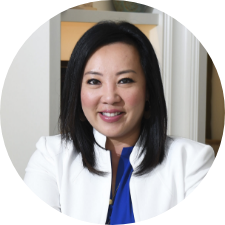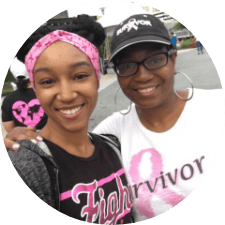Your Breast Cancer Risk
Your breast health journey starts with knowledge. Whether you’re concerned about your risk of breast cancer, have a history of breast cancer or other cancers in your family, or are curious about genetic testing, the first step is learning more about risk.
Everyone is at risk of breast cancer, and some of us are at a higher risk than others. Learning about your breast cancer risk can empower you to make important breast care decisions to take charge of your health.
Use these links to jump to the topics below.
Learn About Your Breast Cancer Risk Factors
Factors linked to an increased risk
Start by understanding which risk factors are linked to an increased risk of breast cancer. Being born female is the most common risk factor for breast cancer. Although men can get breast cancer, it’s about 100 times more common in women. Age is another common risk factor. As you get older, you’re more likely to get breast cancer. Being overweight or obese after menopause, drinking alcohol and taking menopausal hormone therapy are all linked to an increased risk of breast cancer. Smoking may also be linked to an increased risk.
Factors linked to a decreased risk
Some factors are linked to a decreased risk of breast cancer, such as breastfeeding and exercise. Eating fruits and vegetables may also be linked to a decreased risk of breast cancer.
Factors under study
Other factors, such as antidepressants, fertility drugs, parabens and stress, are currently under study. Findings to date are not strong enough to say whether these factors are truly related (or truly not related) to breast cancer. So, more research is needed.
Factors not linked to an increased risk
Some factors are not linked to an increased breast cancer risk, such as breast implants and caffeine.
Explore risk factors
Our Breast Cancer Risk Factors Table lists factors linked – or not linked in some cases – to breast cancer. It also lists many factors under study. Factors are grouped based on the strength of evidence.
Estimating breast cancer risk
Your health care provider can estimate your breast cancer risk using a tool such as the Breast Cancer Risk Assessment Tool. Then together, you and your provider can make decisions about your health such as breast cancer screening.
Next Steps to Take Charge of Your Breast Health
Talk to your family
Talking to your family about your family health history can provide important information about your breast cancer risk. The Family Health History Tool makes it easy for you to gather, record and share your family’s health information. You can use this information to talk with your doctor.
Talk with your doctor
Talk with your doctor and discuss any concerns you have about your breast cancer risk and what to do next. You can ask questions like:
- How can I find out if I’m at higher risk of breast cancer? How accurate are the methods? How will this information help me?
- How do I find out if I have dense breasts? How does having dense breasts affect my risk of breast cancer? What breast cancer screening tests should I have?
- What’s the best way to manage my menopausal symptoms?
- What breast cancer screening tests should I have? When should I start? How often should I get screened?
If you’re at a higher risk of breast cancer…
If you’re at higher risk of breast cancer, talk with your doctor about a screening plan that’s best for you. You may need to be screened earlier and more often than other women.
Talk with your doctor about whether you should consider genetic counseling and genetic testing if, for example, a family member has an inherited gene mutation related to breast cancer. If genetic test results show you have an inherited gene mutation, you may have questions about your options, such as:
- Should I take a risk-lowering drug? What are the benefits and risks for me?
- What about preventive surgery?
- Are there clinical trials enrolling people at high risk of breast cancer? If so, how can I learn more?
Susan G. Komen® Support Resources |
|
Komen Patient Care Center Social media Facebook groups Interactive tool Education materials |
Susan G. Komen Breast Self-Awareness Messages
1. Know your risk
- Talk with both sides of your family to learn about your family health history .
- Talk with a health care provider about your risk of breast cancer.
2. Get screened
- Talk with a health care provider about which screening tests are right for you if you’re at higher risk.
- Have a mammogram every year starting at age 40 if you’re at average risk.*
- Have a clinical breast exam at least every 3 years starting at age 20, and every year starting at age 40.
* Per NCCN Guidelines
3. Know what is normal for you
See a health care provider if you notice any of these breast changes:
- Lump, hard knot or thickening inside the breast or underarm area
- Swelling, warmth, redness or darkening of the breast
- Change in the size or shape of the breast
- Dimpling or puckering of the skin
- Itchy, scaly sore or rash on the nipple
- Pulling in of the nipple or other parts of the breast
- Nipple discharge that starts suddenly
- New pain in one spot that doesn’t go away
To see illustrations of these warning signs, please visit the Warning Signs of Breast Cancer page.
4. Make healthy lifestyle choices
- Maintain a healthy weight.
- Make exercise part of your routine.
- Limit alcohol intake.
- Limit menopausal hormone therapy (postmenopausal hormone use).
- Breastfeed if you can.





